For lunch yesterday we hopped in a couple Ubers to go to downtown Cairo and have koshari at the iconic Abu Tarek.1 Koshari is a staple dish in Egyptian cuisine, it’s a mix of pasta, lentils, and rice topped with spicy tomato sauce, garlic vinegar, crispy fried onions, and sometimes garbanzo beans. It’s a street food but also prepared at home…it is every Egyptian’s comfort food. When Joe and I were first dating he mentioned it and I had never heard of it. Naturally, I googled it and my food nerd mind starting thinking of connections. It’s the rice and beans of Egypt. An economical dish that meets all the nutritional needs of the human body and has been spruced up and personalized with spices and flavors to be delicious and fit a country’s cuisine. It also made me think of the Indian lentil dish kitchiri and upon further investigation, I learned that koshari is a derivative of kitchiri, a gift from the Indian soldiers in Egypt during the British mandate in the late 19th Century. But I digress.
We got in the Ubers. Joe dozed off in the back next to me while his dad chatted about the state of Egypt and overpopulation, etc. in the country. I watched the chaotic traffic flow around me. For being so ruleless it is hardly reckless. It doesn’t seem like there are so many accidents considering the lack of regard for traffic rules. But what do I know. It took about an hour for us to get to Abu Tarek’s, Thursdays are the Middle East’s Friday's, the weekend here being Friday and Saturday. Plus it was rush hour. Also Cairo is huge! A sprawling metropole of about 3,000 km sq. (or about 1800 square miles) with a population of about 24 million people. The rest of our group—Joe’s mom, brother, and sister-in-law—were still stuck in traffic after having had two Ubers cancel on them so we went for a walk, crossing streets a la frogger.
Eventually we made it back to Abu Tarek and met with the rest of our group. To say the place is bustling would be an understatement. I don’t think it slows down from the time they open at 9:00am until closing at midnight. They serve one dish, in a few sizes and varieties and there are the condiments (if you will) on the table. It is a no frills establishment, the food served on melamine dishes.
Abass, the waiter, came to our table to take our order. Within what felt like seconds, the food arrived, piping hot. He could tell (some of us) were foreigners and showed us how it was done, see video below. We devoured our dishes alongside Egyptian sodas.
The food was delicious and I can see how this meal comforts the millions of Egyptians here and abroad. If you’re interested in learning more, Anthony Bourdain (RIP) did an episode on Abu Tarek on his show No Reservations.
As we left, we saw Abu Tarek himself (the founder and owner of his eponymous restaurant) sitting outside on a white plastic chair, watching the success of his fast food dynasty.
We took another Uber (even worse traffic now) to Khan el-Khalili, a famous souq or bazaar in old downtown Cairo teeming with vendors, tourists, and cats. It dates back to the Fatimid Caliphate in the 10th-12th Centuries and has since been a trade site. The stalls are small rooms, built right on top of one another but when they are open, their goods sprawl out halfway into the street. The lights and colors and smells are enchanting.
We shopped for souvenirs and warded off vendors encouraging us to have a look at their goods. At one shop Mina (my sister-in-law) mentioned she wanted water—we’re all getting over colds—and the shop owner immediately told his employee Marwan to go buy four bottles of water for us in Arabic. Mina had spoken to me in English but the shopkeeper obviously speaks English to accommodate the tourists. Joe and I were touched by his thoughtfulness and ended up buying the bulk of our goods from him. I asked what the name of the incense he had in his shop was and he showed me the box. He took one out and handed it to me, telling me that should I have trouble finding the incense, I could have people smell this one to help me find it.
We zigzagged our way up and down the crowded street and marveled at tourist buses squeezing their way through, brushing the goods in the stalls as they did. People from all walks of life were there, going about their business. A young Indian man shopped for a dress for the woman of his dreams, although she doesn’t like me, he kept telling a shopkeeper while showing him a photo of her for size reference. My heart broke at the sight of a little girl, covered in filth, collecting garbage. Young men ran up and down the street pulling and pushing dollies, loaded with goods, yelling at passersby to get out of their way. I was baffled at the sight of a girl in short shorts in the middle of the market seemingly unaware of the modest dress befitting of the region.
Eventually we found a restaurant across from the Mosque of Sultan Barquq for dinner. We sat downstairs while the music from a whirling dervish show blasted from the rooftop of the restaurant. It was nice to hear the music from a distance while we enjoyed our meal.
Afterwards we grabbed another Uber. It seemed we were headed in the opposite direction of traffic, which was nice. Nevertheless the young driver took phone call after phone call on speaker phone as he wove in and out of traffic. He also cleared his apps and switched between apps as he drove. But we made it home safely and that’s what matters, right?
Happy Friday, beautiful people. I hope you had a great week. What is your comfort food? Maybe eat it today or call your mom and have her cook it for you. Or at least get the recipe so you can make it for yourself and someone you love.
Abu Tarek’s is the name of the restaurant but Tarek is a proper name in Arabic and Abu Tarek means father of Tarek. In the Arabic language and culture, a man is called Abu + the name of his first born son. Similarly, his wife would be Um Tarek, or mother of Tarek.

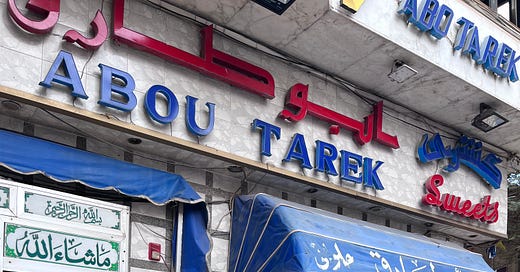



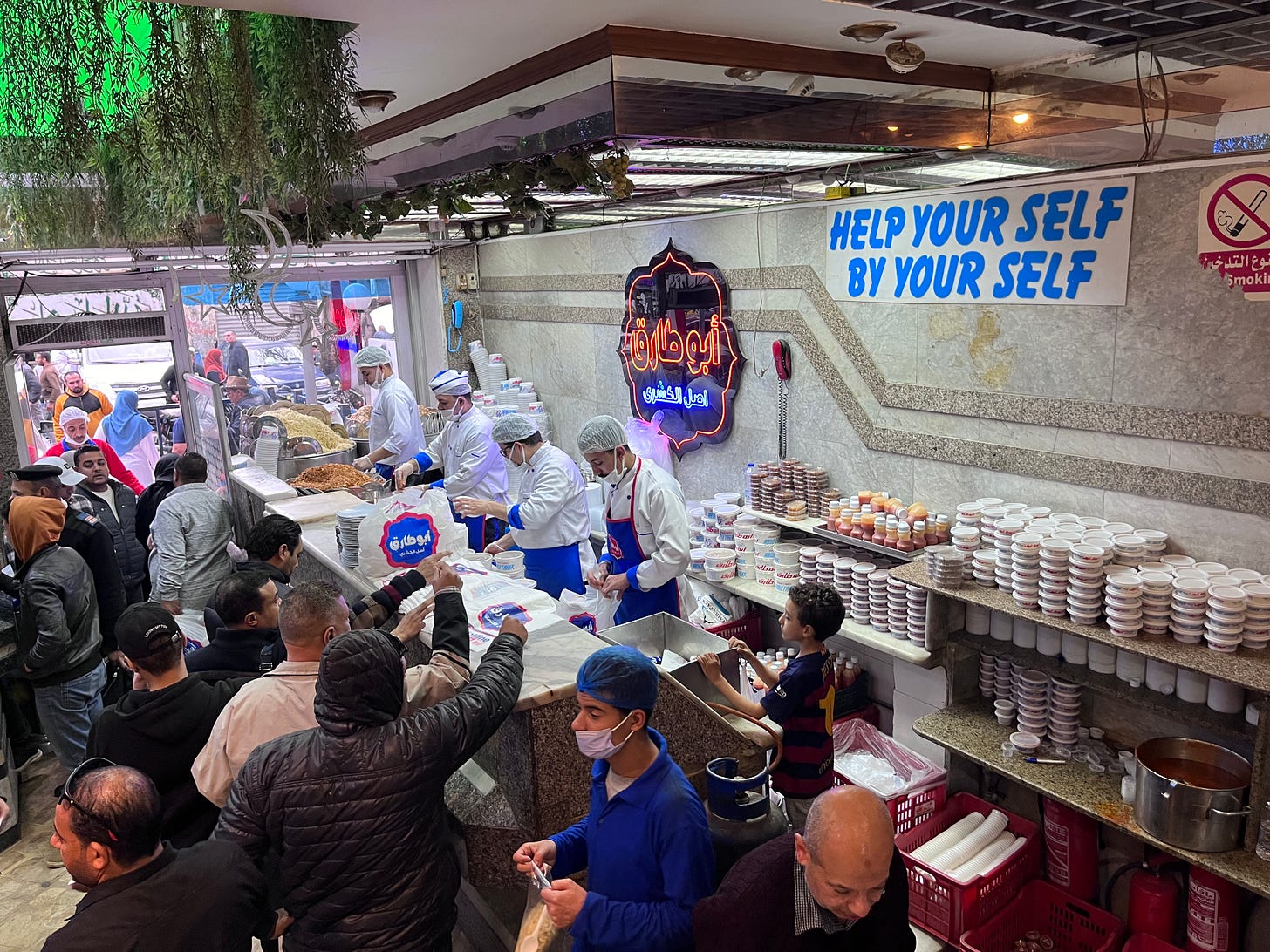
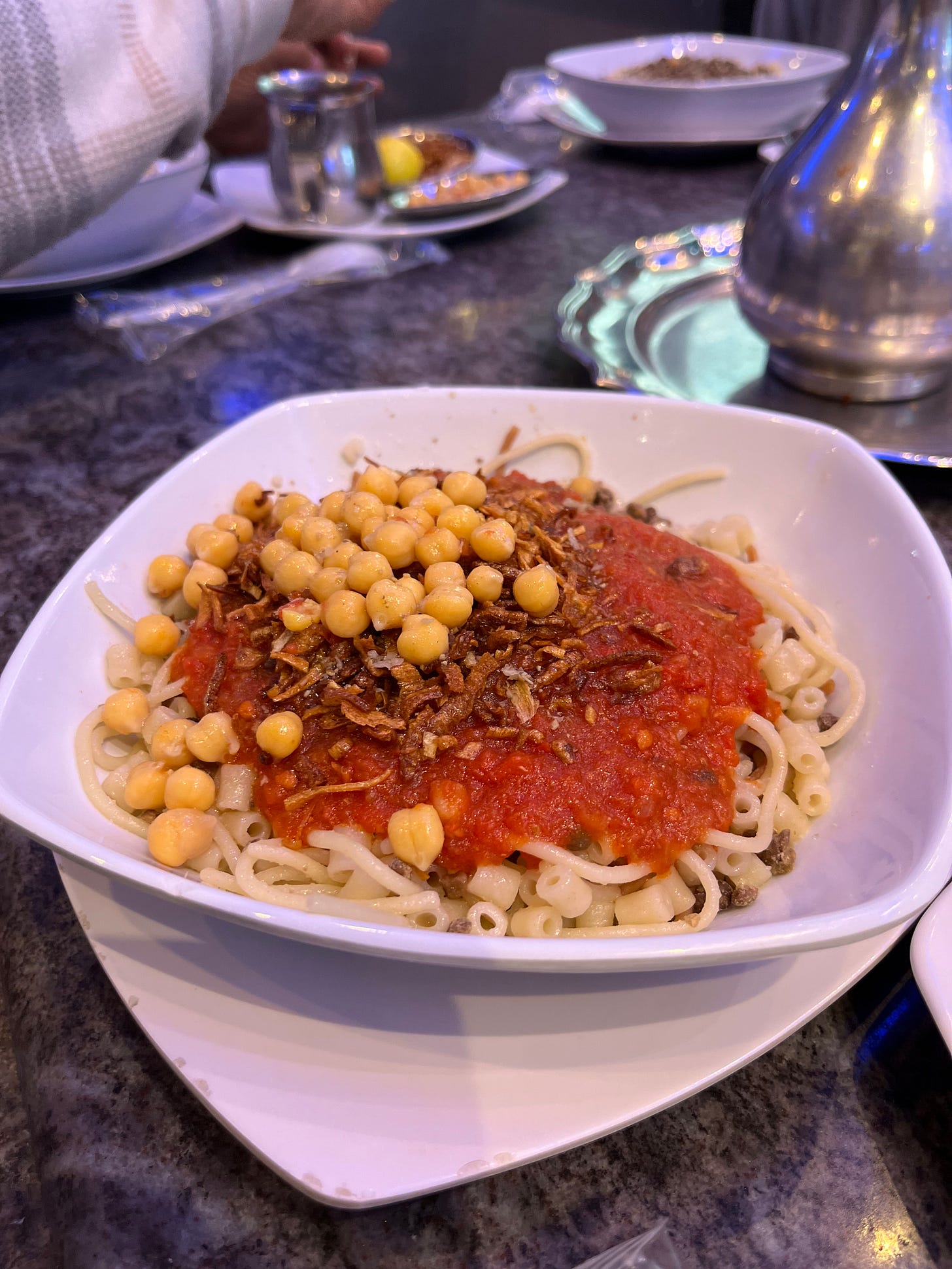
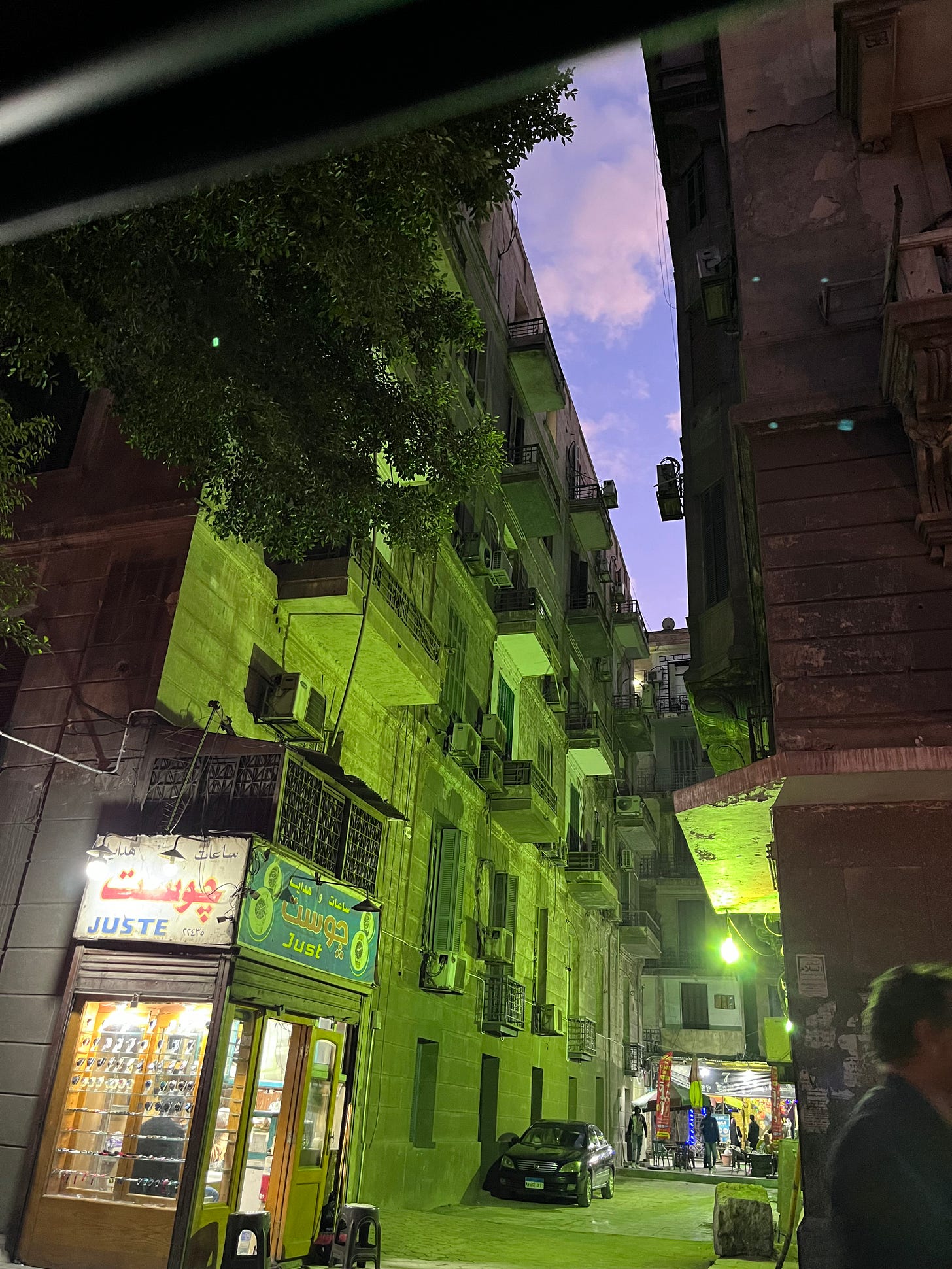
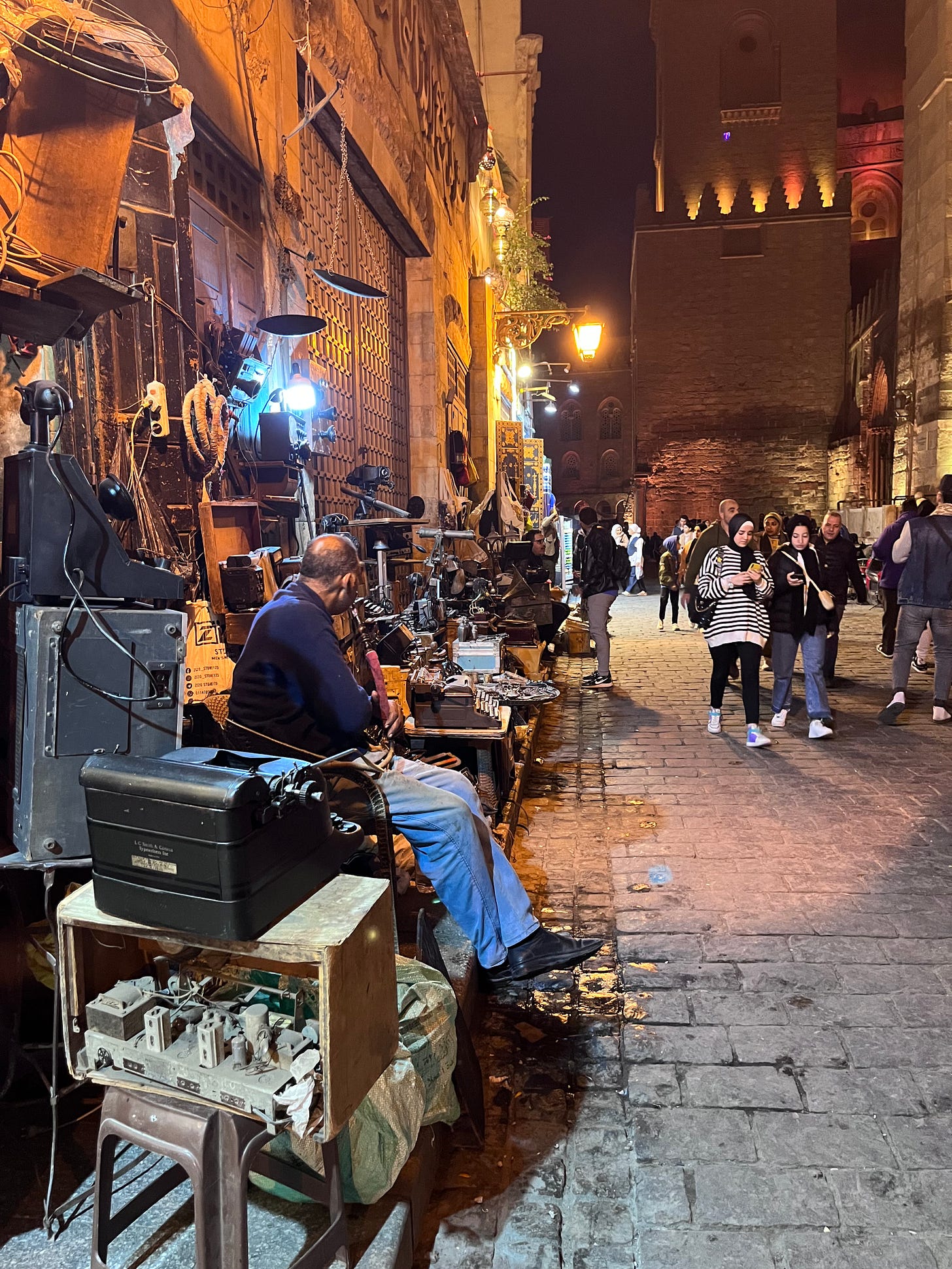
Love seeing Egypt through your eyes and glad you had a great time! Abu tarek yummy!!
That looks delicious!